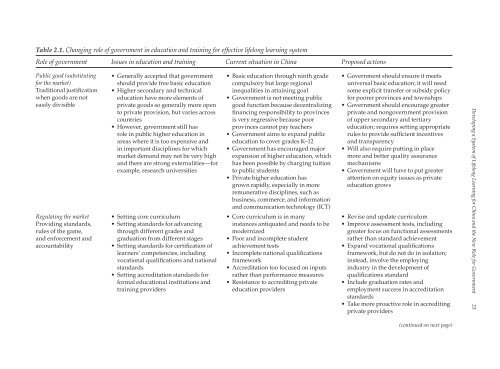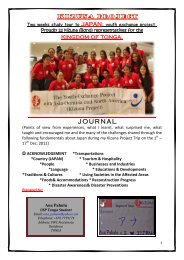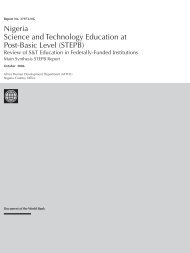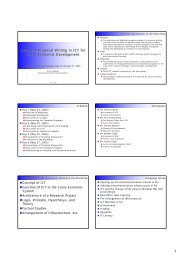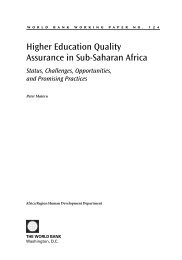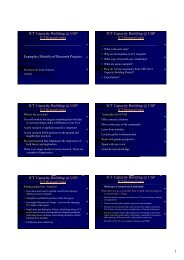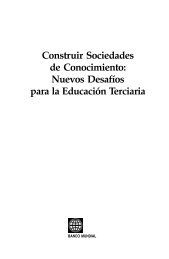Enhancing China's Competitiveness Through Lifelong Learning ...
Enhancing China's Competitiveness Through Lifelong Learning ...
Enhancing China's Competitiveness Through Lifelong Learning ...
Create successful ePaper yourself
Turn your PDF publications into a flip-book with our unique Google optimized e-Paper software.
Table 2.1. Changing role of government in education and training for effective lifelong learning system<br />
Role of government Issues in education and training Current situation in China Proposed actions<br />
Public good (substituting<br />
for the market)<br />
Traditional justification<br />
when goods are not<br />
easily divisible<br />
Regulating the market<br />
Providing standards,<br />
rules of the game,<br />
and enforcement and<br />
accountability<br />
• Generally accepted that government<br />
should provide free basic education<br />
• Higher secondary and technical<br />
education have more elements of<br />
private goods so generally more open<br />
to private provision, but varies across<br />
countries<br />
• However, government still has<br />
role in public higher education in<br />
areas where it is too expensive and<br />
in important disciplines for which<br />
market demand may not be very high<br />
and there are strong externalities—for<br />
example, research universities<br />
• Setting core curriculum<br />
• Setting standards for advancing<br />
through different grades and<br />
graduation from different stages<br />
• Setting standards for certification of<br />
learners’ competencies, including<br />
vocational qualifications and national<br />
standards<br />
• Setting accreditation standards for<br />
formal educational institutions and<br />
training providers<br />
• Basic education through ninth grade<br />
compulsory but large regional<br />
inequalities in attaining goal<br />
• Government is not meeting public<br />
good function because decentralizing<br />
financing responsibility to provinces<br />
is very regressive because poor<br />
provinces cannot pay teachers<br />
• Government aims to expand public<br />
education to cover grades K–12<br />
• Government has encouraged major<br />
expansion of higher education, which<br />
has been possible by charging tuition<br />
to public students<br />
• Private higher education has<br />
grown rapidly, especially in more<br />
remunerative disciplines, such as<br />
business, commerce, and information<br />
and communication technology (ICT)<br />
• Core curriculum is in many<br />
instances antiquated and needs to be<br />
modernized<br />
• Poor and incomplete student<br />
achievement tests<br />
• Incomplete national qualifications<br />
framework<br />
• Accreditation too focused on inputs<br />
rather than performance measures<br />
• Resistance to accrediting private<br />
education providers<br />
• Government should ensure it meets<br />
universal basic education; it will need<br />
some explicit transfer or subsidy policy<br />
for poorer provinces and townships<br />
• Government should encourage greater<br />
private and nongovernment provision<br />
of upper secondary and tertiary<br />
education; requires setting appropriate<br />
rules to provide sufficient incentives<br />
and transparency<br />
• Will also require putting in place<br />
more and better quality assurance<br />
mechanisms<br />
• Government will have to put greater<br />
attention on equity issues as private<br />
education grows<br />
• Revise and update curriculum<br />
• Improve assessment tests, including<br />
greater focus on functional assessments<br />
rather than standard achievement<br />
• Expand vocational qualifications<br />
framework, but do not do in isolation;<br />
instead, involve the employing<br />
industry in the development of<br />
qualifications standard<br />
• Include graduation rates and<br />
employment success in accreditation<br />
standards<br />
• Take more proactive role in accrediting<br />
private providers<br />
Developing a System of <strong>Lifelong</strong> <strong>Learning</strong> for China and the New Role for Government 23<br />
(continued on next page)


